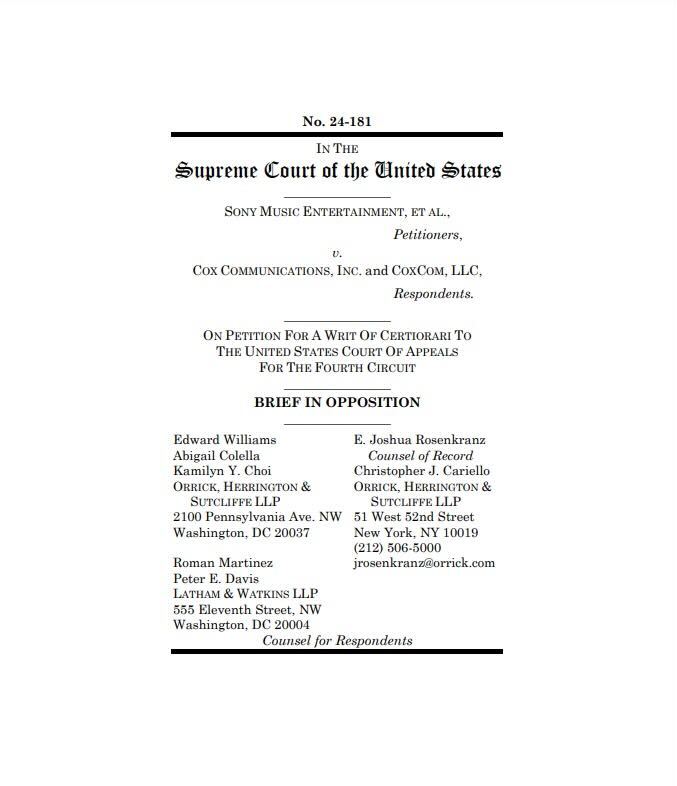Cox Fights Music Industry’s Liability Allegations at Supreme Court
Cox argued that it cannot be held responsible for user piracy, as the music industry pushes for broader liability.
Jericho Casper

WASHINGTON, Oct. 22, 2024 – Cox Communications is defending itself in a copyright infringement case where Sony Music Entertainment and other music industry players seek to hold the company liable for its subscribers' piracy and copyright infringements.

Brief of Cox Communications in Opposition
On Monday, Cox opposed Sony’s Supreme Court request to overturn a lower court ruling in Cox’s favor. Cox is urging the high court to deny the plaintiffs’ petition for a writ of certiorari, arguing that the U.S. Court of Appeals for the Fourth Circuit correctly interpreted law when it vacated an unprecedented $1 billion judgment against Cox in February.
“Plaintiffs forget that they are trying to hold Cox vicariously liable not for anything it has done, but for the infringing acts of its customers.
“Once a subscriber is hooked up to the internet, it is undisputed that Cox cannot control the customer’s online behavior. Cox cannot track users or selectively block content. As an ISP, it simply provides the cables, machinery, and basic infrastructure needed to send and receive data online,” read the opposition brief signed by Joshua Rosenkranz, counsel at Orrick, Herrington and Sutcliffe.
The case revolves around whether Cox, as an Internet Service Provider that charges a flat monthly fee, can be held vicariously liable for copyright infringements committed by its users.
Legal precedent requires two conditions for vicarious liability: That the defendant must profit directly from the infringement; and that the defendant must have the ability to supervise or control the infringing activity.
The Fourth Circuit found that Cox did not meet the first condition, determining that the company’s flat-rate internet service does not result in any “direct financial benefit” from its users’ illegal downloading or file-sharing activities.
“In cases that involve a fee for service, Congress and the courts of appeals universally agree that receiving a recurring flat-fee payment does not “constitute receiving a ‘financial benefit directly attributable to the infringing activity,’”the brief stated.
This case is part of a broader trend of music industry lawsuits targeting ISPs for the copyright violations of their subscribers. A ruling by the Fifth Circuit Court of Appeals against Grande Communications on Oct. 15 found the regional ISP liable for contributory copyright infringement, after failing to terminate the accounts of known repeat infringers.
While the Fifth Circuit's ruling against Grande Communications primarily addressed contributory liability, Cox's case involves the additional legal question of whether ISPs can be held vicariously liable for their users’ copyright infringement.
Cox’s legal brief highlighted the company’s anti-piracy measures, which it claimed has reduced infringing traffic on its network by 95 percent.









Member discussion